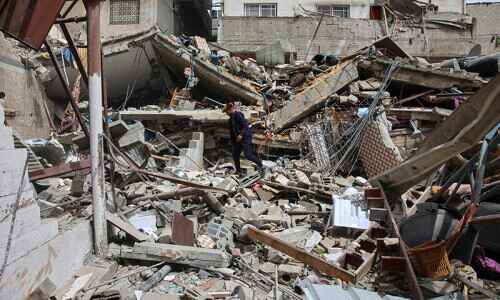GAZA STRIP: Israel said it is prepared to pick up the stalled negotiations with Hamas on a cease-fire and prisoner release agreement to put an end to the conflict that has been raging since October 7 and unleashed destructive airstrikes on Gaza early on Thursday.
Health officials and Hamas media reported that Israeli soldiers killed at least fifty Palestinians in aircraft and ground bombardments throughout the Gaza Strip.
Two predawn airstrikes in Gaza City alone resulted in the deaths of 26 individuals, including 15 children, according to the civil defense service for the Gaza Strip. According to agency spokesman Mahmud Bassal, two strikes occurred inside a mosque compound, killing ten people, while one struck a family home in the Al-Daraj neighborhood, killing sixteen.
The Israeli military did not immediately provide a statement.
The armed wings of Hamas and its affiliate Islamic Jihad claimed to have fired mortar barrages at Israeli troops, sparking fierce street fighting in Gaza’s Jabalia and Rafah.
As three European nations announced on Wednesday that they would recognize a Palestinian state, international pressure for a ceasefire has increased on Israel and its Prime Minister, Benjamin Netanyahu.
In order to “ensure what we have seen tonight never happens again,” Netanyahu vowed to keep up the fight against Hamas. However, his office added that the Israeli negotiating team had been asked “to continue negotiations for the return of the hostages” by the war cabinet.
The US, Egyptian, and Qatari mediators broke up the previous round of peace negotiations soon after Israel began attacking Gaza’s far-southern city of Rafah at the beginning of this month.
In spite of protests from around the world, including from its closest ally, the United States, Israel proceeded with its assault on the final Gaza city to be captured by ground forces.
A humanitarian emergency
Concerns were expressed by Washington that the approximately 1.4 million Palestinians who were stranded in the city may end up in the line of fire. Since then, Israel has issued orders for the city’s mass evacuation, and according to the UN, over 800,000 people have left.
On Thursday, US Treasury Secretary Janet Yellen issued a warning about the possibility of a “humanitarian crisis” in the event that Israel closes off a vital financial line to Palestinian banks.
At the G7 finance ministers’ meeting in Stresa, northern Italy, she told reporters, “I’m particularly concerned by Israel’s threats to take action that would lead to Palestinian banks being cut off from their Israeli correspondent banks.”
“These banking channels are essential for handling transactions that enable the nearly $8 billion in annual imports from Israel—such as fuel, water, electricity, and food—as well as the nearly $2 billion in annual exports that are essential to Palestinian livelihoods.”
When asked what action the US and G7 should take in response, Yellen mentioned that she had written Israeli Prime Minister Netanyahu months prior regarding the economic circumstances in the occupied West Bank.
“And as I said, I think that if Palestinian banks are cut off from Israeli correspondence, it would eventually create a humanitarian crisis,” she stated.
fierce combat
Again, there was fierce fighting in Gaza. In the north, urban fighting has also resurfaced in places like Jabalia, which Israeli soldiers initially invaded a few months ago. Additionally, Israel’s siege has denied the majority of potable water, food, fuel, and medications to Gaza’s 2.4 million inhabitants.
After Israeli forces seized control of the Palestinian side of the Rafah border crossing with Egypt, the irregular delivery of aid by truck further slowed.
While some aid has been transported in via a US-built pier and humanitarian supplies have been airdropped into Gaza by Jordan and other countries, many trucks have been rapidly overrun by frantic crowds.








